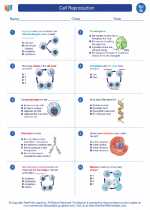Cell Reproduction -> fluid balance
Fluid Balance
Fluid balance refers to the equilibrium between the intake and output of fluids in the body. It is essential for maintaining proper physiological functions and overall health. The body's fluid balance is regulated by the kidneys, which control the amount of water excreted in urine, and by hormonal mechanisms that regulate thirst and fluid retention.
Factors Affecting Fluid Balance
- Fluid Intake: This includes drinking fluids and consuming foods that contain water.
- Fluid Loss: Fluids are lost through urine, sweat, breathing, and digestive processes.
- Regulatory Hormones: Hormones such as antidiuretic hormone (ADH) and aldosterone help regulate the body's fluid balance.
- Health Conditions: Certain medical conditions, such as kidney disease or diabetes, can affect fluid balance.
Importance of Fluid Balance
Maintaining fluid balance is crucial for various bodily functions, including:
- Regulating body temperature
- Transporting nutrients and oxygen to cells
- Removing waste products from the body
- Supporting proper digestion and absorption of nutrients
- Supporting overall cellular function
Study Guide
Key Concepts
- Define fluid balance and explain its importance in the human body.
- Identify the factors that affect fluid balance.
- Explain the role of the kidneys and hormonal mechanisms in regulating fluid balance.
- Discuss the impact of health conditions on fluid balance.
Study Tips
- Review the functions of bodily fluids and their role in overall health.
- Understand the processes of fluid intake and output in the body.
- Explore the physiological mechanisms involved in maintaining fluid balance.
- Research common health conditions that can disrupt fluid balance.
Practice Questions
- What is the significance of maintaining fluid balance in the body?
- How do the kidneys contribute to the regulation of fluid balance?
- Discuss the impact of hormonal mechanisms on fluid balance.
- Explain how certain health conditions can disrupt fluid balance.
By understanding the principles of fluid balance, you will gain insights into the physiological mechanisms that support overall health and well-being.
[Fluid Balance] Related Worksheets and Study Guides:
.◂Science Worksheets and Study Guides Seventh Grade. Cell Reproduction
Study Guide Cell Reproduction
Cell Reproduction  Activity Lesson
Activity Lesson Mitosis & Meiosis
Mitosis & Meiosis  Worksheet/Answer key
Worksheet/Answer key Cell Reproduction
Cell Reproduction  Worksheet/Answer key
Worksheet/Answer key Cell Reproduction
Cell Reproduction  Worksheet/Answer key
Worksheet/Answer key Cell Reproduction
Cell Reproduction  Vocabulary/Answer key
Vocabulary/Answer key Cell Reproduction
Cell Reproduction  Vocabulary/Answer key
Vocabulary/Answer key Cell Reproduction
Cell Reproduction  Vocabulary/Answer key
Vocabulary/Answer key Cell Reproduction
Cell Reproduction  Vocabulary/Answer key
Vocabulary/Answer key Cell Reproduction
Cell Reproduction  Vocabulary/Answer key
Vocabulary/Answer key Cell Reproduction
Cell Reproduction  Vocabulary/Answer key
Vocabulary/Answer key Cell Reproduction
Cell Reproduction  Vocabulary/Answer key
Vocabulary/Answer key Cell Reproduction
Cell Reproduction  Vocabulary/Answer key
Vocabulary/Answer key Cell Reproduction
Cell Reproduction 

 Activity Lesson
Activity Lesson
 Worksheet/Answer key
Worksheet/Answer key
 Worksheet/Answer key
Worksheet/Answer key
 Worksheet/Answer key
Worksheet/Answer key
 Vocabulary/Answer key
Vocabulary/Answer key
 Vocabulary/Answer key
Vocabulary/Answer key
 Vocabulary/Answer key
Vocabulary/Answer key
 Vocabulary/Answer key
Vocabulary/Answer key
 Vocabulary/Answer key
Vocabulary/Answer key
 Vocabulary/Answer key
Vocabulary/Answer key
 Vocabulary/Answer key
Vocabulary/Answer key
 Vocabulary/Answer key
Vocabulary/Answer key

The resources above cover the following skills:
LIFE SCIENCE
From Molecules to Organisms: Structures and Processes
Gather and synthesize information to explain how prokaryotic and eukaryotic cells differ in structure and function, including the methods of asexual and sexual reproduction.